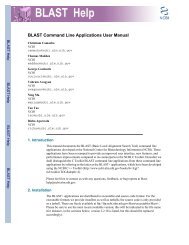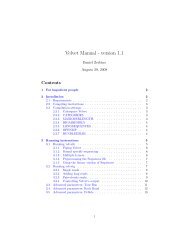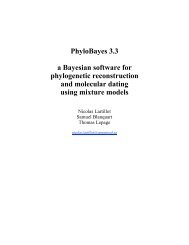PAUP* 4.0 Beta: Command Reference --Draft Version 3--
PAUP* 4.0 Beta: Command Reference --Draft Version 3--
PAUP* 4.0 Beta: Command Reference --Draft Version 3--
Create successful ePaper yourself
Turn your PDF publications into a flip-book with our unique Google optimized e-Paper software.
<strong>Command</strong>s used in the PAUP Block<strong>Command</strong> <strong>Reference</strong>upper bound via the stepwise addition algorithm.FDONLY = YES|NOIf FDONLY = YES, then a frequency distribution of tree scores isoutput for all trees less than or equal to the score specified by theKEEP option. This option is not permitted unless it is used inconjunction with the KEEP score option.FDTYPE = BARCHART|HISTOGRAMThe default FDTYPE specifies that the number of trees at each treescore is output as a BARCHART. If FDTYPE = HISTOGRAM, tree scoresare pooled into classes, the size of which is specified by the NCLASSESoption.NCLASSES = integer-valueInteger-value specifies the number of class intervals for thefrequency distribution of tree scores. By default, NCLASSES = 20, sothat adjacent tree scores are pooled into 20 classes of tree scores. Thisoption is only available when FDTYPE = HISTOGRAM.FDFILE = frequency-distribution-file-nameIf FDFILE is specified, the data for the frequency distribution of treescores are saved to a text file for input to other programs. The FDFILEoption is not persistent. Frequency-distribution-file-name specifies thename of the file to receive the frequency distribution. See "Input/Output files" on page 9 for instructions to specify the full path nameof a file.REPLACE = YES|NOIf FDFILE is used and the specified file already exists you willbe prompted for confirmation that the existing file should bereplaced. REPLACE suppresses this prompt; the existing filewill be quietly overwritten by the new data.ADDSEQ = FURTHEST|ASIS|SIMPLE|MAXMINI|KMAXMINIADDSEQ specifies the way in which taxa are selected for nextaddition to the tree at the current node of the search tree. FURTHESTis usually the fastest, although it is not permitted unless allcharacters are of type ORD or UNORD (it will automatically beoverridden by SIMPLE in this case).MULTREES = YES|NOOrdinarily, <strong>PAUP*</strong> saves all minimal trees it finds during the branchand-boundsearch. You can use MULTREES = NO to save only one ofthe best trees found. If you only want to know the score of the besttree(s), use this option. The single tree found is guaranteed to be ofminimum score and the search often runs much faster.See "Tree-searching options" on page 31 under "Options Affecting Multiple<strong>Command</strong>s" for a description of the following options:38 February, 2002 <strong>PAUP*</strong> <strong>4.0</strong> beta documentation





